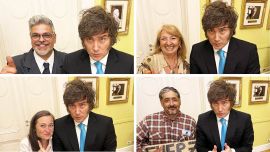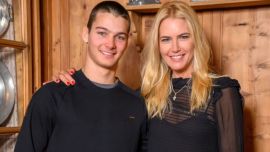Francis Mallmann, Argentina’s superstar chef and a lover of nature, Patagonia and potatoes, is considered to be the “king of fire,” which he uses in all its forms for his cooking.
With his beret, red-framed glasses, light blue eyes and wearing a broad white smock over a pink shirt, Mallmann carefully works around a circular structure heated by an impressive brazier at his restaurant located at the Château La Coste, Le Puy-Sainte-Réparade in the south of France, his only European establishment.
Hanging from the metal framework we can see red cabbage, pineapples and celeriac, all smoked between 10 and 12 hours.
The chef, with the appearance of a dandy and nearly 900,000 followers on Instagram, stirs a very meaty octopus tentacle on the grills, placed directly over the fire.
“What I like most is to cook outdoors,” says the smiling 67-year-old, who spent his childhood in Patagonia, where he returned to often.
In Le Puy-Sainte-Réparade, the kitchen is also outdoors, but on the terrace. Like at his other establishments in Argentina, Uruguay, Chile and Miami, fire is the hub of all his preparations.
“All my restaurants use fire. In this case we have two techniques, but in some of them we can have up to seven or 10 different techniques,” says the father of seven children aged between four and 42, speaking in French.
However, in the 1980s, the chef was far from that fiery and somewhat wild universe which he so likes to showcase on his Instagram account.
‘My own style’
Trained in Europe, particularly in France, in the kitchens of some of the greatest chefs of that decade, Mallmann published his first books in the 1980s, when he had a television show and his restaurants were thriving. He wore a big white hat back then.
“I was pretty arrogant, I thought I was the best chef ... I would cook caviar and salmon, I took everything very seriously,” he recalls, alluding to his episode on the Netflix culinary series Chef’s Table.
At the suggestion by a Cartier executive, who, after a dinner he organised, “kindly” advised him to leave French cooking and also the International Academy of Gastronomy, he decided to change course radically.
In 1995, he was invited to take part in the Academy’s prestigious contest, and the Argentine decided to go back to his roots, presenting the chefs assembled at a hotel in Frankfurt-am-Main dishes made exclusively from Peruvian root vegetables brought from the Andes in Cuzco, thanks to the help of one of his disciples, Germán Martitegui, who went on to carve out his own career as a successful chef in Argentina.
“I realised I didn’t have my own language in the kitchen,” Mallmann recalls today, looking back on those days. “I had to find my own style. I used to just copy what I had learned at three-star restaurants, where I was trained.”
‘Turning point’
Ever since that “turning point,” Mallman’s cooking became simpler. He obtains the best out of all the products he uses, thanks to fire.
“After 30 years, I’m beginning to master this technique,” he underlined.
Argentine chef Lucía Soria, who has worked alongside Mallman for a long time Mallman, ails his influence.
“His legacy is ... simplicity in cooking. Not covering up flavours but trying to make them shine on their own, without so much processing,” the 40-year-old told AFP.
“An ingredient which always makes me think of him is the potato, because he is the king of potatoes. He loves them, he has a thousand ways to cook them,” Soria, who now runs a restaurant in the Uruguayan capital of Montevideo, added.
related news
by Martin de Montvalon, AFP

























Comments